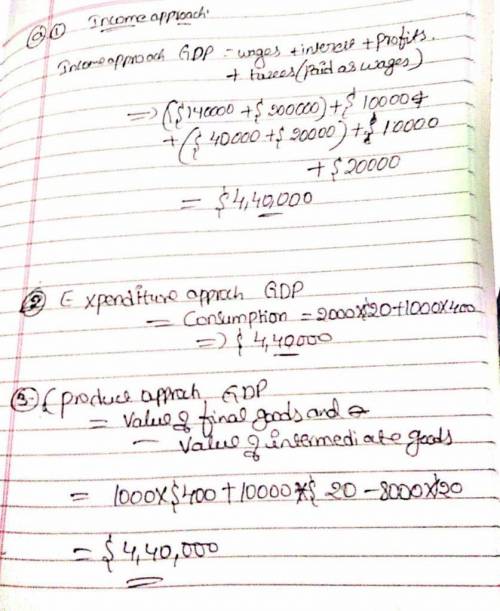Consider an economy with two firms and a government.
Firm 1 produces 10000 units of good...

Business, 10.03.2020 22:34 jadenicole908
Consider an economy with two firms and a government.
Firm 1 produces 10000 units of good X, which it sells for $20 per unit. It uses this revenue to pay $140000 in wages, $10000 in taxes, and $10000 in interest on a loan, with the rest as profits. Firm 1 sells some of its output to consumers, and some to
Firm 2 as an intermediate good in their production process. Firm 2 uses good X as an input into its manufacturing process. It buys 8000 units of good X and uses them to create 1000 units of good Y, which it sells for $400 per unit. It pays $200000 in wages and $20000 in taxes, with the rest as profits.
The government takes in taxes from only these two firms, and uses it to pay wages to provide government services, for instance national defense.
b) A foreign competitor enters the market for good X. Consumers and firm 2 still consume the same level of good X; however, Firm 1 now only produces 8000 units of good X, with the foreign firm selling 2000 units of good X (1000 to consumers and 1000 to Firm 2). Firm 1 pays the same wages and taxes as it did when it sold 10 000 units of good X.
Question: It is discovered that this "foreign" firm is actually owned by Firm 1, but is located outside of the country. Re-calculate GDP (gross domestic product) from part (b). What, if anything, does this tell you about the difference between GDP and GNP?

Answers: 2
Another question on Business

Business, 22.06.2019 10:00
Employees at a library check out books to patrons. books have an isbn and a name. the library sometimes has multiple copies of the same book. books have one or more authors. a patron is an individual who has an active (non-expired) library card. for each library card, we store the person's first and last names and their address. for each employee, we store their employee id, current salary, first and last name and their address. we also store the employee id of their current manager. each time we check out a book to a patron we need to store the date of the transaction, the employee who checked out the book to the patron, and the library card of the patron. some employees have library cards. if an employee patron turns in a book late, the fine that they pay is a percentage of their salary. some employees are authors who have library cards—they are allowed to check out as many books as they like.
Answers: 1

Business, 22.06.2019 22:20
What type of negotiating strategy requires the supplier to open its books to the purchasers? a. competitive biddingb. cost-based price modelc. price-based modeld. market-based price modele. transparent negotiations
Answers: 1

Business, 23.06.2019 00:30
An emerging methodology to integrate the effort of the development team and the operations team to improve the functionality and security of applications is known as
Answers: 1

Business, 23.06.2019 00:40
You are a team of marketing consultants. it is 2008 and the great recession has struck. one of your clients is whole foods market (sometimes known as whole paycheck). wfm has come to you and asked for strategic advice on how to adapt their product and pricing strategies in light of the economic downturn: 1. advise wfm on the various approaches that could be taken to reducing price. be sure to consider potential psychological impact of price reductions on wfm consumers. 2. based on the options outlined in part 1, recommend an approach and support with marketing theory.
Answers: 2
You know the right answer?
Questions


English, 14.08.2019 08:30

Mathematics, 14.08.2019 08:30

Biology, 14.08.2019 08:30



Mathematics, 14.08.2019 08:30

Mathematics, 14.08.2019 08:30

Mathematics, 14.08.2019 08:30

Mathematics, 14.08.2019 08:30


English, 14.08.2019 08:30



History, 14.08.2019 08:30

Spanish, 14.08.2019 08:30


English, 14.08.2019 08:30





